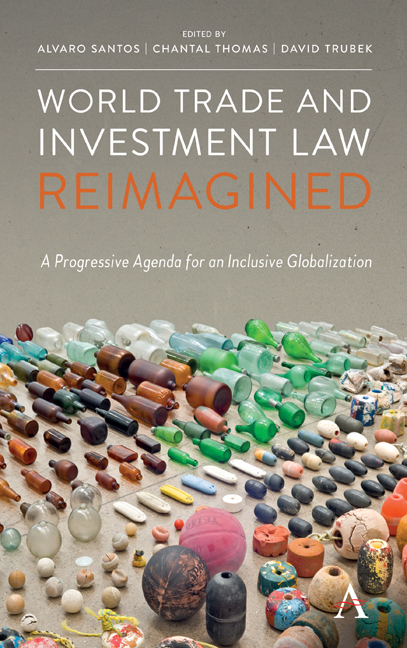Book contents
- Frontmatter
- Contents
- Acknowledgments
- List of Contributors
- Introduction World Trade and Investment Law in a Time of Crisis: Distribution, Development and Social Protection
- PART I RETHINKING THE POLITICAL ECONOMY OF TRADE: COMMENTS ON DANI RODRIK'S STRAIGHT TALK ON TRADE
- PART II SETTING THE STAGE FOR A PROGRESSIVE VISION: EMERGING ISSUES IN WORLD TRADE AND INVESTMENT LAW
- SECTION 1 MAPPING THE NEW CONTEXT FOR TRADE AND INVESTMENT LAW
- SECTION 2 DEALING WITH MAJOR CHANGES IN THE WORLD ECONOMY
- Chapter Eleven Trade, Distribution and Development under Supply Chain Capitalism
- Chapter Twelve The Global Rise and Regulation of Platform Firms and Markets
- Chapter Thirteen How Should We Think about a Global Market in Legal Cannabis?
- SECTION 3 FRAMING A MORE EQUITABLE INVESTMENT LAW REGIME
- SECTION 4 SUPPORTING DEVELOPMENT
- SECTION 5 REINFORCING SOCIAL PROTECTION: SPREADING THE BENEFITS OF TRADE, DEALING WITH LOSSES AND EXPLORING THE TRADE–IMMIGRATION NEXUS
- Index
Chapter Eleven - Trade, Distribution and Development under Supply Chain Capitalism
from SECTION 2 - DEALING WITH MAJOR CHANGES IN THE WORLD ECONOMY
Published online by Cambridge University Press: 07 September 2019
- Frontmatter
- Contents
- Acknowledgments
- List of Contributors
- Introduction World Trade and Investment Law in a Time of Crisis: Distribution, Development and Social Protection
- PART I RETHINKING THE POLITICAL ECONOMY OF TRADE: COMMENTS ON DANI RODRIK'S STRAIGHT TALK ON TRADE
- PART II SETTING THE STAGE FOR A PROGRESSIVE VISION: EMERGING ISSUES IN WORLD TRADE AND INVESTMENT LAW
- SECTION 1 MAPPING THE NEW CONTEXT FOR TRADE AND INVESTMENT LAW
- SECTION 2 DEALING WITH MAJOR CHANGES IN THE WORLD ECONOMY
- Chapter Eleven Trade, Distribution and Development under Supply Chain Capitalism
- Chapter Twelve The Global Rise and Regulation of Platform Firms and Markets
- Chapter Thirteen How Should We Think about a Global Market in Legal Cannabis?
- SECTION 3 FRAMING A MORE EQUITABLE INVESTMENT LAW REGIME
- SECTION 4 SUPPORTING DEVELOPMENT
- SECTION 5 REINFORCING SOCIAL PROTECTION: SPREADING THE BENEFITS OF TRADE, DEALING WITH LOSSES AND EXPLORING THE TRADE–IMMIGRATION NEXUS
- Index
Summary
Despite significant global growth in both trade and foreign investment volumes during the past 40 years, many developing nations and their domestic firms still struggle to realize the development benefits of this economic expansion. Although the Asian Tigers— China, India and a few others— have achieved significant increases in income per capita and reductions in poverty rates, most developing countries remain woefully short of their development goals notwithstanding a major shift in the composition of developing-country exports from resource-based products to manufactured goods and a significant increase in developing-country manufactures as a percentage of total global manufactures. One factor contributing to these disappointing development results is the now dominant organization of global production through disaggregated, geographically disbursed, nonproprietary supply chains governed increasingly by concentrated buyer firms, which I term “supply chain capitalism.”
In this essay, I will suggest how the organization of global production into supply chain capitalism limits the bargaining power and innovative capacity of many (if not most) developing states and their domestic firms, as well as their ability to capture an equitable share of the rents from participation in global trade. In addition, I will describe ways in which supply chain capitalism complicates national trade and development policymaking and makes it more difficult for many developing countries to achieve sustainable development benefits from global trade.
In the face of these challenges, standard progressive prescriptions for development through trade seem insufficient: for developing-country firms, focus on innovation and upgrade your position in global supply chains; for national development policymakers, secure sufficient domestic policy space to support your firms and their access to the chains. If the goal is a more equitable global distribution of power and resources, we will need a much richer understanding of the complex of norms and institutional formations that underpin the allocations of power and resources within supply chain capitalism. The traditional tools for national trade policy— tariffs, subsidies, strategic liberalization, industrial policy— and the global trade rules that govern them will be part of the story but not the most significant part. Explicating the key legal and institutional drivers that enable, facilitate, reinforce and sustain supply chain capitalism should bring into focus the significance of numerous legal regimes— national and transnational, public and private— beyond trade law and policy that constrain the bargaining power, policy choices and development outcomes of much of the developing world.
- Type
- Chapter
- Information
- World Trade and Investment Law ReimaginedA Progressive Agenda for an Inclusive Globalization, pp. 121 - 130Publisher: Anthem PressPrint publication year: 2019



